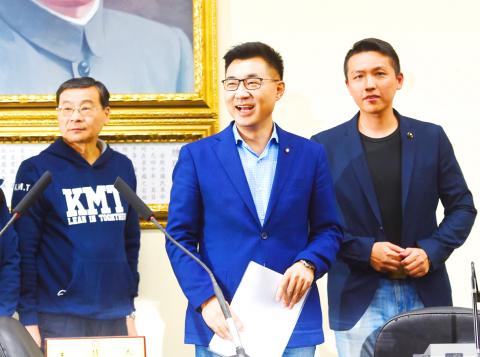Chinese Nationalist Party (KMT) Legislator Johnny Chiang (江啟臣) won the party’s chairperson by-election yesterday with nearly 69 percent of the vote over former Taipei mayor Hau Lung-bin (郝龍斌).
Voting favored Chiang in all 22 counties and cities, KMT statistics showed.
In Taipei, where Hau served as mayor from 2006 to 2014, Chiang garnered nearly 60 percent of the votes, gaining about 2,600 more than Hau.

Photo: Fang Pin-chao, Taipei Times
Votes from party members overseas were expected to favor Hau, but the party’s data showed that most went to Chiang.
The by-election had a low turnout of only 35.85 percent, or 124,019 people out of 345,971 who were eligible to vote.
Chiang received 84,860 votes, or 68.8 percent of the valid ballots, while Hau received 38,483. There were 676 invalid votes.
Hau issued a statement at about 6pm — before vote-counting had been completed — acknowledging defeat and congratulating Chiang on winning the election.
Hau thanked the members who voted and the volunteers who helped with the election process.
Chiang has a significant burden to bear over the next year and we hope he lives up to his promise of change, Hau said.
Hau said he has always believed, and still does, that if the KMT is strong, it can help make Taiwan a better place.
Chiang thanked supporters for voting for him and said their choice ensured that the KMT’s handover from the previous generation to the next would be successful.
Chiang said that he would institute organizational changes in the KMT and place less emphasis on party headquarters and more on local party chapters.
This would enable the party to be more connected to local residents, he said.
He promised to upgrade, improve and digitize party affairs, saying that this would be just the beginning of sweeping changes.
“The KMT from now on will be a party that is more modern and swift to respond to demands,” Chiang said.
Chiang said that he had spoken with Hau on the telephone and hopes to work with him to introduce reforms that would improve the KMT.
The by-election was to fill the vacancy left by Wu Den-yih (吳敦義), who stepped down last month after the party’s losses in the Jan. 11 presidential and legislative elections.
The KMT plans to hold an inauguration ceremony for Chiang tomorrow morning.

CHAOS: Iranians took to the streets playing celebratory music after reports of Khamenei’s death on Saturday, while mourners also gathered in Tehran yesterday Iranian Supreme Leader Ayatollah Ali Khamenei was killed in a major attack on Iran launched by Israel and the US, throwing the future of the Islamic republic into doubt and raising the risk of regional instability. Iranian state television and the state-run IRNA news agency announced the 86-year-old’s death early yesterday. US President Donald Trump said it gave Iranians their “greatest chance” to “take back” their country. The announcements came after a joint US and Israeli aerial bombardment that targeted Iranian military and governmental sites. Trump said the “heavy and pinpoint bombing” would continue through the week or as long

TRUST: The KMT said it respected the US’ timing and considerations, and hoped it would continue to honor its commitments to helping Taiwan bolster its defenses and deterrence US President Donald Trump is delaying a multibillion-dollar arms sale to Taiwan to ensure his visit to Beijing is successful, a New York Times report said. The weapons sales package has stalled in the US Department of State, the report said, citing US officials it did not identify. The White House has told agencies not to push forward ahead of Trump’s meeting with Chinese President Xi Jinping (習近平), it said. The two last month held a phone call to discuss trade and geopolitical flashpoints ahead of the summit. Xi raised the Taiwan issue and urged the US to handle arms sales to

State-run CPC Corp, Taiwan (CPC, 台灣中油) yesterday said that it had confirmed on Saturday night with its liquefied natural gas (LNG) and crude oil suppliers that shipments are proceeding as scheduled and that domestic supplies remain unaffected. The CPC yesterday announced the gasoline and diesel prices will rise by NT$0.2 and NT$0.4 per liter, respectively, starting Monday, citing Middle East tensions and blizzards in the eastern United States. CPC also iterated it has been reducing the proportion of crude oil imports from the Middle East and diversifying its supply sources in the past few years in response to geopolitical risks, expanding

Pro-democracy media tycoon Jimmy Lai’s (黎智英) fraud conviction and prison sentence were yesterday overturned by a Hong Kong court, in a surprise legal decision that comes soon after Lai was jailed for 20 years on a separate national security charge. Judges Jeremy Poon (潘兆初), Anthea Pang (彭寶琴) and Derek Pang (彭偉昌) said in the judgement that they allowed the appeal from Lai, and another defendant in the case, to proceed, as a lower court judge had “erred.” “The Court of Appeal gave them leave to appeal against their conviction, allowed their appeals, quashed the convictions and set aside the sentences,” the judges